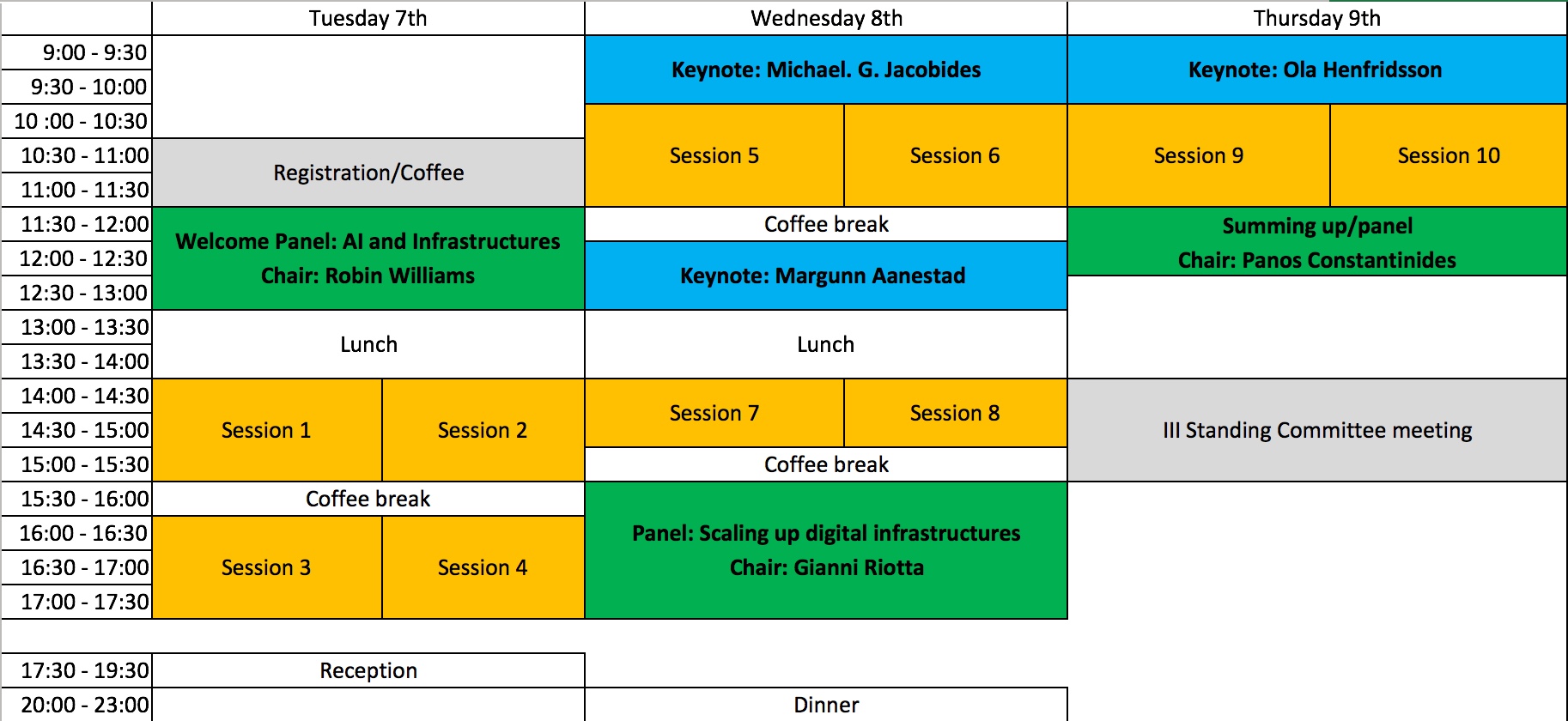5th Innovation in Information Infrastructures (III) Workshop
Following the tradition of previous editions, the 5th Innovation in Information Infrastructures (III) workshop will focus on transformation in digital infrastructures. Digital infrastructures herald a new stage in the evolution of digital information systems, reflecting the fact that digital technologies have become deeply socially embedded, and are coordinated through diverse sociotechnical worlds and standards (Bolton and Foxon 2015).
Following the tradition of previous editions, the 5th Innovation in Information Infrastructures (III) workshop will focus on transformation in digital infrastructures. Digital infrastructures herald a new stage in the evolution of digital information systems, reflecting the fact that digital technologies have become deeply socially embedded, and are coordinated through diverse sociotechnical worlds and standards (Bolton and Foxon 2015).
We encourage conceptualizations of processes of transformation in digital infrastructures. Specifically, because of their reconfigurable nature, digital infrastructures enable new capabilities to be added after a product or a tool has been designed and produced (Yoo et al 2010). We are also interested in the digitalization of organisational processes and on the role of digital platforms enabling the transformation of practices within and across organisational boundaries (Henfridsson et al 2014). Such platforms give rise to new organizational forms of co-production and collaboration and redraw the very nature of industrial sectors’ and organisational boundaries (Parker et al 2016; Tiwana et al 2010).
Though the emphasis is on digital infrastructures, we acknowledge that solid information infrastructure concepts and sound methodological approaches must take into account the much broader nature of infrastructure phenomena. Building on the tradition of historical studies of infrastructures, such as electricity networks (Hughes 1983; Graham and Marvin 2001), we also encourage conceptualizations of information infrastructures as political sociotechnical networks that require collective action and governance (Constantinides and Barrett 2015, Spagnoletti et al. 2015).
We call for contributions that focus on either the special theme on transformation in digital infrastructures or the general theme on information infrastructures based on empirical research in relevant settings. We anticipate contributions based on empirical research from the public and private sector, and from a range of different industries and domains and we call for contributions related to, but not limited to, the following themes:
- innovations in digital infrastructures
- the transformation of social and work practices through such innovations
- the impact of such innovations on individual and social identities
- the design, development and implementation of information infrastructures across different settings (e.g. e-health, e-justice, supply chain, etc)
- the governance and control of information infrastructures
- digital manufacturing
- digital cities
- the Internet of Things
- auditing and surveillance
- the security and privacy of personal and other data shared through digital infrastructures
- information infrastructure standards
- market infrastructures
- ecosystems of platforms
- methodological challenges in studying information infrastructures
References
- Bolton, R. and Foxon, T.J., 2015. Infrastructure transformation as a socio-technical process – Implications for the governance of energy distribution networks in the UK. Technological Forecasting and Social Change, 90, pp.538-550.
- Constantinides, P., & Barrett, M. (2015). Information infrastructure development and governance as collective action. Information Systems Research, 26(1), 40–56.
- Graham, S., and Marvin, S. (2001). Splintering urbanism: networked infrastructures,technological mobilities and the urban condition. New York: Routledge
- Henfridsson, O., Mathiassen, L. and Svahn, F., 2014. Managing technological change in the digital age: the role of architectural frames. Journal of Information Technology, 29(1), pp.27-43.
- Hughes, T. P. (1983). Networks of power: electrification in Western society, 1880-1930. JHU Press.
- Parker, G., Van Alstyne, W., & Choudary, S. P. (2016). Platform Revolution: How Networked Markets Are Transforming the Economy-and How to Make Them Work for You. New York, London: Norton.
- Spagnoletti, P., Resca A., and Lee, G. 2015. A Design Theory for Digital Platforms Supporting Online Communities: A Multiple Case Study. Journal of Information Technology, 30, pp.364–80.
- Tiwana, A., Konsynski, B., & Bush, A. A. (2010). Platform evolution: coevolution of platform architecture, governance, and environmental dynamics. Information Systems Research, 21(4), 675–687.
- Yoo, Y., Henfridsson, O., & Lyytinen, K. (2010). The new organizing logic of digital innovation: An agenda for information systems research. Information Systems Research, 21(4), 724–735.
Workshop program

Download the full programme here
We accept short papers (3 to 4 pages) within the deadline. They must be submitted online via EasyChair at the following link: https://easychair.org/conferences/?conf=iii2017
Important dates
| Deadline for submission of short papers: | July 1st 2017 |
| Decision of acceptance: | August 1st 2017 |
| Final program available: | September 25 2017 |
| Workshop: | November 7th to 9th 2017 |
Venue
The workshop will take place at LUISS University in viale Pola 12 Campus. For logistic information, please contact the workshop organizers at infoworkshop@pezzilli.com
Workshop Committee
- Cristina Alaimo (Surrey Business School)
- Margunn Aanestad (University of Oslo)
- Panos Constantinides (Warwick Business School)
- Ola Henfridsson (Warwick Business School)
- Benjamin Eaton (University of Surrey)
- Silvia Elaluf-Calderwood (Florida International University)
- Amany Elbanna (Royal Holloway London)
- Ingrid Erickson (Syracuse University)
- Vladislav Formin (Vytautas Magnus University)
- Hanne Cecilie Geirbo (University of Oslo)
- Miria Grisot (University of Oslo)
- Ole Hanseth (University of Oslo)
- Kai Jakobs (Aachen University)
- Tina Blegind Jensen (Copenhagen Business School)
- Dina Koutsikouri (University of Gothenburg)
- Heejin Lee (Yonsei University)
- Kalle Lyytinen (Case Western Reserve University)
- Lars Mathiassen (Georgia State University)
- Eric Monteiro (Norwegian U. of Sci.and Tech.)
- Hajar Mozaffar (University of Edinburgh)
- Elena Parmiggiani (NTNU)
- Elpida Prasopoulou (Coventry University)
- Lisen Selander (University of Gothenburg)
- Carsten Sorensen (London School of Economics)
- Paolo Spagnoletti (LUISS University)
- Francois-Xavier de Vaujany (Paris Dauphine)
- Polyxeni Vasilakopoulou (University of Agder)
- Robin Williams (University of Edinburgh)
- Youngjin Yoo (Case Western Reserve University)
- Jiang Yu (Chinese Academy of Sciences)
Sponsored by
Share
Tag
